Best Construction Estimating Software
Best construction estimating software includes clear estimates, first bit ERP contracting & construction, touch base, candy, Methvin, etc. Construction cost estimating software assists professionals in achieving their objectives and needs.



No Cost Personal Advisor
List of 20 Best Construction Estimating Software
Contenders | 2024
The Most Affordable All-in-One Construction Manage
Contractor Foreman is a fully featured Construction Management Software designed to serve Agencies, Enterprises. Contractor Foreman provides end-to-end solutions designed for Web App. This online Construction Management system offers Commercial, Inspection Management, Subcontractor Management, Accounting Integration, Injury Reporting at one place. Read Contractor Foreman Reviews
Explore various Contractor Foreman features, compare the pricing plans, and unlock the potential of seamless operations by selecting the right software for your business.
Features
View all Contractor Foreman Features- Subcontractor Management
- Time Clock
- Time Management
- CRM
- Recurring Appointments
- Proposal Management
- Quality Control Checklist
- Automatic Time Capture
Pricing
Contractor Foreman Caters to
- StartUps
- SMBs
- Agencies
- Enterprises
Contenders | 2024
Streamline Your Business Processes with FirstBit E
End-to-end ERP for growing CONTRACTING & CONSTRUCTION in the UAE: Real-time reporting, BOQ, Estimation, Quotation, Approvals, Project cost control, Project revenue & cost analysis, Purchasing, Tendering, Labor cost, overheads allocation, and many more. Read FirstBit ERP Contracting & Construction Reviews
Explore various FirstBit ERP Contracting & Construction features, compare the pricing plans, and unlock the potential of seamless operations by selecting the right software for your business.
- Mobile Access
- Contractor Management
- Multi-Location
- Project billing
- Contractors
- Access Controls/Permissions
- Multi Lingual
- Returns Management
FirstBit ERP Contracting & Construction Caters to
- StartUps
- SMBs
- Agencies
- Enterprises
Software by Procore Technologies
Procore provides cloud-based construction software to clients across the globe. Using its award-winning suite of project management tools, hundreds of thousands of registered Procore users manage all types of construction projects including industrial plants, office buildings, apartment complexes, university facilities, retail centers, and more. Read PROCORE Reviews
Explore various PROCORE features, compare the pricing plans, and unlock the potential of seamless operations by selecting the right software for your business.
Features
View all PROCORE Features- Timesheet Management
- Bid Management
- Subcontractor Management
- Purchase Management
- Billing & Invoicing
- Resident Portal
- Residential Properties
- Accounts Receivable
PROCORE Caters to
- StartUps
- SMBs
- Agencies
- Enterprises
Contenders | 2024
We build project management culture for your enter
TouchBase offers project mgt solutions to Professional Services, Pharma, EPC, Engineering, etc. It supports business cases, proposals, NPD, schedule, resources, costs, procurement, risks, etc. It integrates with ERPs, CRMs, Accounting. Read Kytes Reviews
Explore various Kytes features, compare the pricing plans, and unlock the potential of seamless operations by selecting the right software for your business.
Features
View all Kytes Features- Reporting & statistics
- Include Photos In Reports
- Filtered Search
- Time Tracking by Client
- Pricing Management
- Accounts Receivable
- Data Visualization
- Collaboration
Kytes Caters to
- StartUps
- SMBs
- Agencies
- Enterprises
Emergents | 2024
Construction Management Software
Tactive Construction Management Software for Infrastructure, EPC, Contracting companies and Builders to complete their projects efficiently and manage their entire company's operations. Read TACTIVE Construction Management Reviews
Explore various TACTIVE Construction Management features, compare the pricing plans, and unlock the potential of seamless operations by selecting the right software for your business.
- Subcontracting Management
- Accounting Management
- Integration capabilities
- Employee Management
- Approval Workflow
- Job Scheduling
- Gantt Charts
- Project Management
TACTIVE Construction Management Caters to
- StartUps
- SMBs
- Agencies
- Enterprises
Contenders | 2024
All-in-one bidding and estimating software
Conwize is a cloud-based platform that simplifies the bidding and costing process at the tender stage to protect your company from critical mistakes so you can win more tenders and execute them profitably. Read ConWize Reviews
Explore various ConWize features, compare the pricing plans, and unlock the potential of seamless operations by selecting the right software for your business.
Features
View all ConWize Features- Building Product Database
- Version Control
- Quotes / Estimates
- Subcontractor Management
- File Sharing
- RFP Management
- Bidder Management
- Proposal Management
ConWize Caters to
- StartUps
- SMBs
- Agencies
- Enterprises
Software by Eque2
Construction for Sage 50 Lite package was created by people who understand the challenges of running a small to medium sized construction business, who know that finances can be tight and who realise the crucial importance of increasing efficiency throughout your operations. Read Eque2 Reviews
Explore various Eque2 features, compare the pricing plans, and unlock the potential of seamless operations by selecting the right software for your business.
Features
View all Eque2 Features- Dashboard
- Contract Management
- CRM
- Maintenance Management
Eque2 Caters to
- StartUps
- SMBs
- Agencies
- Enterprises
Software by Clear Estimates
Clear Estimates is a cloud-based estimating software that enables you to create professional estimates in minutes and remotely access the proposals from anywhere. This easy to use application provides accurate data and powerful templates to create pitch-perfect and insightful estimates. Read Clear Estimates Reviews
Explore various Clear Estimates features, compare the pricing plans, and unlock the potential of seamless operations by selecting the right software for your business.
Features
View all Clear Estimates Features- Change Orders
- Historical Database
- Building Product Database
- Bid Management
- Cost Database
- What-if Analysis
- Reporting/Analytics
- Project Management
Clear Estimates Caters to
- StartUps
- SMBs
- Agencies
- Enterprises
Contenders | 2024
Highly recommended by experts in Construction Indu
Our cloud-based end-to-end solution is a centralized way to work with your real-time data, projection & forecasting anytime anywhere. CloudES is a revolutionary software for construction industry, built to automate operations to generate maximum efficiency and revenue. Read CloudES Reviews
Explore various CloudES features, compare the pricing plans, and unlock the potential of seamless operations by selecting the right software for your business.
Features
View all CloudES Features- Data Integration
- Real Time Monitoring
- Risk Assessment
- Real Time Tracking
- Project budgeting
- Collaboration
- Project Management
- Client Management
CloudES Caters to
- StartUps
- SMBs
- Agencies
- Enterprises
Contenders | 2024
Online construction management & estimating Suite
Methvin Estimating Application is a cloud-based construction estimating software that helps contractors and construction professionals to quickly and accurately generate cost estimates, tender documents, and project schedules. Read Methvin Reviews
Explore various Methvin features, compare the pricing plans, and unlock the potential of seamless operations by selecting the right software for your business.
Features
View all Methvin Features- Work order management
- Project Management
- Project Scheduling
- Takeoff and measurement tools
- Quality Management
- 2D Drawing
- Access control
- Estimating
Pricing
Single User Totally
$ 0
Per Month
Business
$ 27
Per Month
Enterprise
$ 165
Per Month
Methvin Caters to
- StartUps
- SMBs
- Agencies
- Enterprises
Contenders | 2024
No more missed symbols, no more costly mistakes an
JengAI: By leveraging the power of AI to swiftly and accurately analyze intricate architectural drawings, JengAI empowers subcontractors to confidently place faster bids and achieve supremely efficient takeoffs. Read JengAI Reviews
Explore various JengAI features, compare the pricing plans, and unlock the potential of seamless operations by selecting the right software for your business.
Features
View all JengAI Features- Project tracking and progress monitoring
- Estimating accuracy and validation tools
- Bid management and tracking
- Bidding and proposal generation
- Takeoff
Pricing
JENGAI Lyte
$ 499
Per Month
Advanced
$ 599
Per Month
JengAI Caters to
- StartUps
- SMBs
- Agencies
- Enterprises
Emergents | 2024
Software by ProEst Estimating Software
ProEst's construction estimating software helps to accurately calculate the estimate for any size of projects. Save the time, money and increase the accuracy by advanced and flexible features. Learn more about ProEst
Explore various ProEst features, compare the pricing plans, and unlock the potential of seamless operations by selecting the right software for your business.
Features
View all ProEst Features- Procurement Management
- Asset Management
- Supplier Management
- Service Management
- Project Management
- Task Management
- Construction Breakdowns
- Document / Photo Management
ProEst Caters to
- StartUps
- SMBs
- Agencies
- Enterprises
Emergents | 2024
Software by PlanSwift
With the visual point-and-click interface of PlanSwift, users can directly drag and drop individual parts or assemblies to a digitized blueprint to collect quantities of takeoffs and start the estimation process. With just one click, measure linear measurements, angles, other parameters in seconds. Learn more about PlanSwift
Explore various PlanSwift features, compare the pricing plans, and unlock the potential of seamless operations by selecting the right software for your business.
Features
View all PlanSwift Features- Site Balancing
- Assembly Takeoff
- Elevation Checking
- Error Checking
- Project Management
- 3D View
- What-if Analysis
- Reporting/Analytics
PlanSwift Caters to
- StartUps
- SMBs
- Agencies
- Enterprises
Emergents | 2024
Software by Bizprac Software
Bizprac is a fully featured Accounting Software designed to serve Agencies, SMEs. Bizprac provides end-to-end solutions designed for Windows. This online Accounting system offers Bank Reconciliation, Residential, Change Orders, Budget Tracking/Job Costing, Commercial at one place. Learn more about Bizprac
Explore various Bizprac features, compare the pricing plans, and unlock the potential of seamless operations by selecting the right software for your business.
Features
View all Bizprac Features- Incident Reporting
- Residential
- RFI & Submittals
- Contract Management
- Subcontractor Management
- Historical Database
- Equipment Tracking
- Billing & Invoicing
Bizprac Caters to
- StartUps
- SMBs
- Agencies
- Enterprises
Emergents | 2024
Software by PrioSoft
PrioSoft is a construction software that helps to create quotes, process orders, schedule task, track budget and expenses, and many more. It is undoubtedly the easy, best, precise, and professional estimating software that provides a detailed insight into your construction estimating business. Learn more about PrioSoft
Explore various PrioSoft features, compare the pricing plans, and unlock the potential of seamless operations by selecting the right software for your business.
Features
View all PrioSoft Features- Subcontractor Management
- What-if Analysis
- Job Costing
- Estimating
- Billing & Invoicing
- CRM
- Work order management
- Job Management
PrioSoft Caters to
- StartUps
- SMBs
- Agencies
- Enterprises
Emergents | 2024
Software by Quoter Software Inc
Active Takeoff is a fully featured Construction Management Software designed to serve Startups, SMEs. Active Takeoff provides end-to-end solutions designed for Web App. This online Construction Management system offers Slope Routines, Customizable Templates, Takeoff, Elevation Checking, Electrical Estimating at one place. Learn more about Active Takeoff
Explore various Active Takeoff features, compare the pricing plans, and unlock the potential of seamless operations by selecting the right software for your business.
Features
View all Active Takeoff Features- Cross Section Creation
- Assembly Takeoff
- Electrical Estimating
- HVAC Estimating
- Workflow Configuration
- Dashboard
- Plumbing Estimating
- Takeoff
Active Takeoff Caters to
- StartUps
- SMBs
- Agencies
- Enterprises
Emergents | 2024
Software by Estimator360
Estimator360 helps the contractors and builders by providing instant and responsive build options that create the estimates and projects in the quickest time possible. With this software patent-pending, intelligent Ratios, instant assemblies, build Options, estimates, creating projects is fast and easy. Learn more about Estimator360
Explore various Estimator360 features, compare the pricing plans, and unlock the potential of seamless operations by selecting the right software for your business.
Features
View all Estimator360 Features- Reporting/Analytics
- Quotes / Estimates
- Residential
- Audit Trail
- Job Scheduling
- Bid Management
- Customizable Templates
- What-if Analysis
Pricing
Standard
$ 269
Per Month
Estimator360 Caters to
- StartUps
- SMBs
- Agencies
- Enterprises
Emergents | 2024
Software by CostMiner
CostMiner is a fully featured Construction Management Software designed to serve Startups, Agencies. CostMiner provides end-to-end solutions designed for Web App. This online Construction Management system offers Customizable Templates, Reporting/Analytics, Takeoff at one place. Learn more about CostMiner
Explore various CostMiner features, compare the pricing plans, and unlock the potential of seamless operations by selecting the right software for your business.
Features
View all CostMiner Features- Reporting/Analytics
- Customizable Templates
- Takeoff
CostMiner Caters to
- StartUps
- SMBs
- Agencies
- Enterprises
Emergents | 2024
Software by iSqFt
iSqFt is a fully featured Construction Management Software designed to serve Agencies, SMEs. iSqFt provides end-to-end solutions designed for Windows. This online Construction Management system offers Bidder Management, Subcontractor Management, Takeoff, Estimating, Contractors at one place. Learn more about iSqFt
Explore various iSqFt features, compare the pricing plans, and unlock the potential of seamless operations by selecting the right software for your business.
Features
View all iSqFt Features- Takeoff
- Estimating
- Mobile Access
- Contractors
- Bidder Management
- Subcontractor Management
- Building Product Database
iSqFt Caters to
- StartUps
- SMBs
- Agencies
- Enterprises
Emergents | 2024
ESTIMATING, PLANNING AND PROJECT CONTROL
Candy is a fully-featured construction estimating software designed to serve enterprises, SME's, agencies. Candy provides end-to-end solutions. This online business intelligence system offers customizable templates, estimating, takeoff at one place. Learn more about Candy
Explore various Candy features, compare the pricing plans, and unlock the potential of seamless operations by selecting the right software for your business.
Features
View all Candy Features- Forecasting
- Project Management
- Plumbing Estimating
- Electrical Estimating
- Job Costing
- Historical Database
- Takeoff
- Cost Database
Candy Caters to
- StartUps
- SMBs
- Agencies
- Enterprises
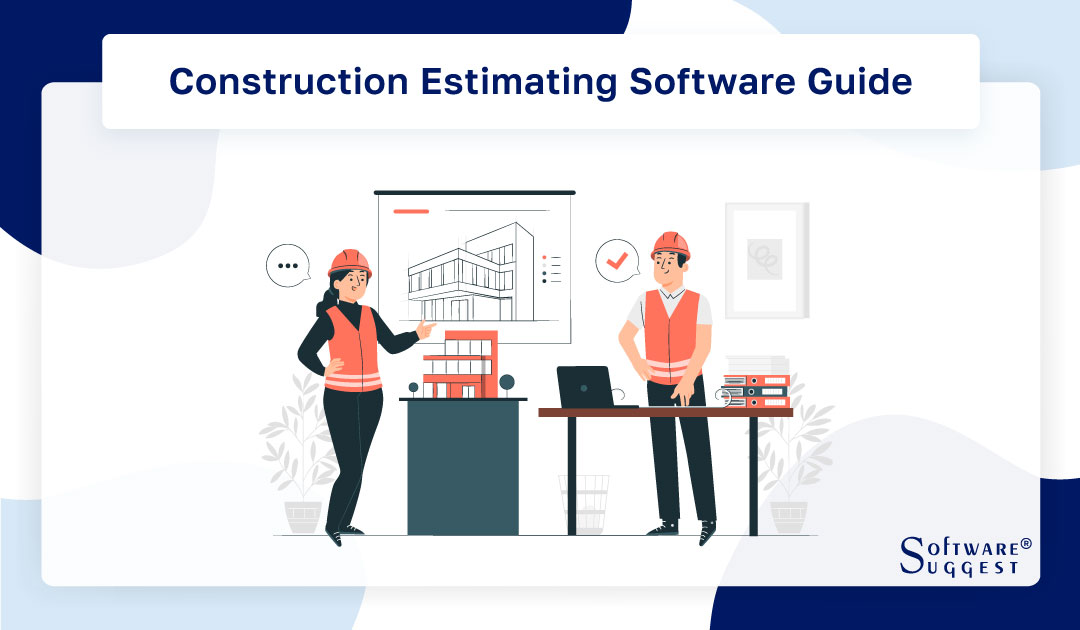
Have you ever wondered about the $1.87 billion rise in global construction estimating software by 2027 at an 8.6% CAGR? Construction estimating software plays a pivotal role in streamlining operations for construction professionals.
From enhancing accuracy in project benefits and features to overcoming challenges associated with manual calculations, estimating programs can revolutionize the construction landscape.
What is Construction Estimating Software?
Construction estimating software is a specialized digital tool designed to facilitate accurate cost assessments for construction projects. It automates the estimation process by analyzing project details, materials, labor, and other factors, providing detailed cost projections. This digital solution not only expedites the estimation process but also enhances accuracy, which is crucial for project budgeting and profitability.
By using sophisticated algorithms, it adjusts to various project specifications and guarantees effective resource distribution. In the modern construction management world, where accuracy and productivity are critical, this builder estimating software has turned into a vital tool for experts. Thus aiming to optimize project planning and financial outcomes.
Who Uses Construction Estimating Software?
From project managers optimizing resource allocation to contractors securing competitive bids, construction estimation software serves as a linchpin across diverse roles. Discover how this technology empowers professionals at every stage of the construction process. Let's learn about the users of contractor estimating software.
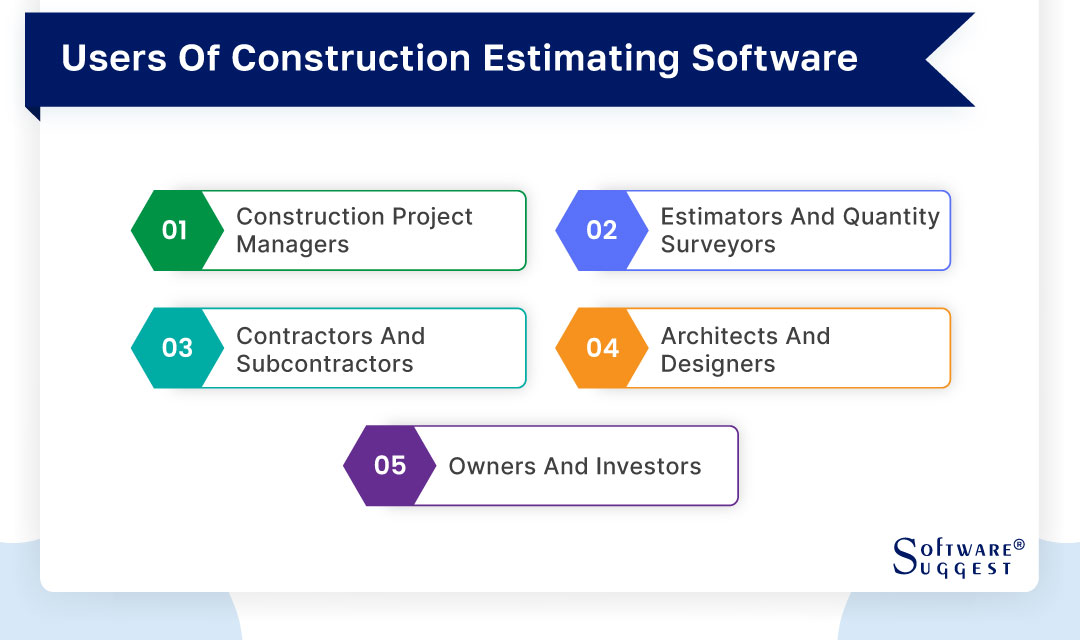
-
Construction project managers
Construction project managers rely on construction project management software as a strategic tool for project planning and budgeting. By inputting project specifics, material costs, and labor expenses, the construction project estimating software generates precise estimates. This streamlines resource allocation, reducing the likelihood of cost overruns.
Also, ensuring that projects adhere to both budget and timeline constraints. The building estimating software becomes an invaluable asset, providing project managers with a comprehensive view of financial implications. Also, it fosters proactive decision-making throughout the project lifecycle.
-
Estimators and quantity surveyors
Estimators and quantity surveyors find a reliable ally in construction project estimating software. Thus enhancing their ability to navigate complex cost analyses. The precision of the construction management software allows these professionals to generate accurate projections, a critical factor in the competitive bidding landscape.
This streamlines the bidding process, enabling them to submit compelling and realistic bids. As a result, they witness an increased success rate in securing projects, fostering professional growth, and strengthening relationships with clients based on trust and accuracy.
-
Contractors and subcontractors
Contractors and subcontractors utilize construction estimating program to create project estimates (bids), a process crucial for securing contracts. By inputting detailed project specifications and relevant variables, the software calculates costs.
Thus enabling these professionals to provide clients with transparent and accurate cost breakdowns. This transparency builds trust with clients, enhancing the likelihood of winning contracts. Construction costing software, therefore, becomes an essential tool in their toolkit, ensuring competitiveness in the dynamic construction market.
-
Architects and designers
Architects and designers integrate the best construction estimating tools into the design phase, aligning creative visions with budgetary considerations. By incorporating cost estimations early on, they ensure that the project remains within financial parameters. This collaborative approach enhances communication between design and construction teams.
Thus fostering a more cohesive and efficient project development process. The builder estimating software becomes a bridge between creativity and financial feasibility, enabling architects and designers to deliver projects that are both imaginative and economically viable.
-
Owners and investors
Owners and investors gain valuable insights from construction calculation software, guiding their investment decisions based on accurate cost projections. This information empowers them to align projects with overarching financial goals, ensuring a strategic and profitable portfolio.
Accurate estimates contribute to a transparent project lifecycle, building stakeholder confidence and facilitating smooth project execution. Construction management software thus becomes an indispensable tool for owners and investors. It is especially for those seeking to make informed choices that drive financial success in construction ventures.
What are the Benefits of Estimating Software?
Construction calculation software is transforming the construction landscape, offering a spectrum of benefits. From precise cost projections to streamlined project management, explore how this digital innovation is reshaping the industry. Let's see the importance of construction estimating software in detail.
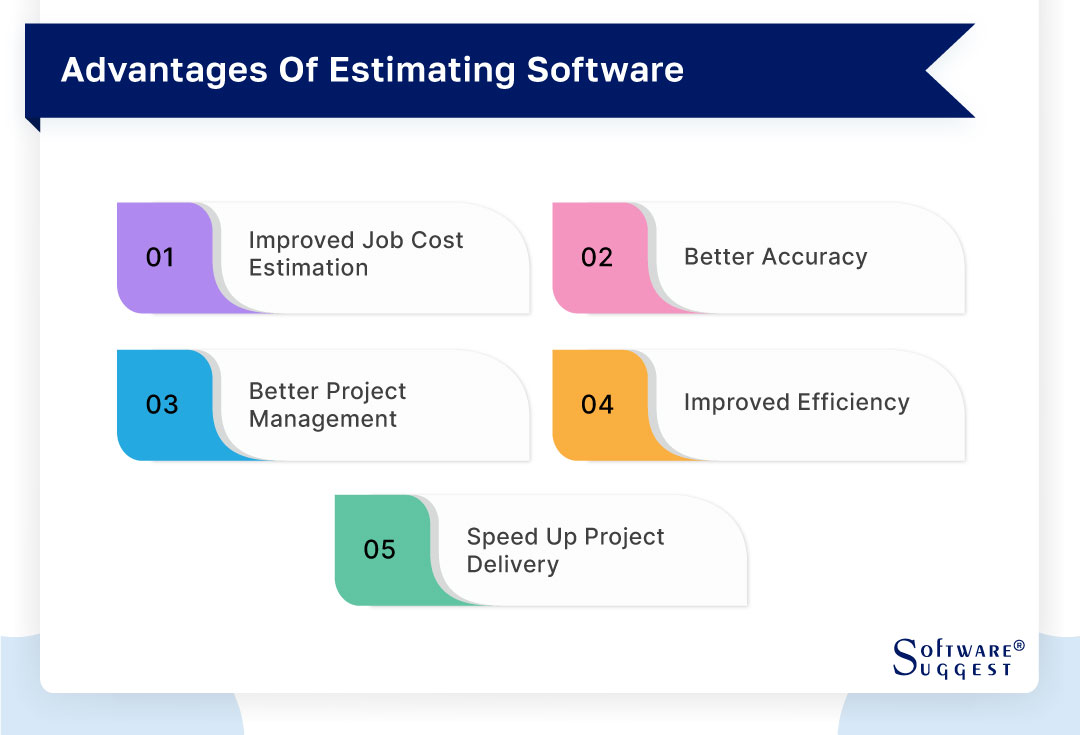
-
Improved job cost estimation
Construction cost estimating software revolutionizes the job cost estimation process within the construction industry. Traditionally, manual estimation processes were time-consuming and prone to errors. Construction project management tools streamline this task by automating complex calculations considering factors such as material costs, labor expenses, and project specifications.
This leads to more accurate and reliable job cost estimates. The software allows for meticulous breakdowns of costs, ensuring that each element of the project is accounted for. This precision in estimating job costs lays the foundation for better financial planning and resource allocation.
-
Better accuracy
The best construction estimating programs utilize advanced algorithms to analyze various parameters. Thus reducing the risk of human error associated with manual calculations.
Accurate estimates are essential for construction professionals to develop realistic budgets and bid competitively for projects. The ability to provide clients with precise cost breakdowns instills confidence and transparency. Hence fostering trust between contractors, subcontractors, and clients.
-
Better project management
The best building estimating software plays a pivotal role in project management by providing construction professionals with comprehensive insights into the financial aspects of a project. It makes efficient resource allocation and budgeting possible, guaranteeing that projects stay within budgetary bounds.
By integrating construction pricing software with project management tools, construction teams get project estimates and can create a seamless workflow. Project managers may make well-informed decisions with the help of real-time data on expenses and cost estimates. As a result, financial risks are reduced and projects are successfully completed within allocated funds.
-
Improved efficiency
The efficiency gains offered by construction scheduling software are substantial. Automating the estimation process significantly reduces the time and effort required to generate accurate cost projections. Construction professionals can create estimates swiftly and with greater detail.
Thus allowing them to focus on strategic aspects of project planning and execution. The construction estimating software's ability to handle complex calculations and data analysis ensures that professionals can work more efficiently. Hence leading to increased productivity and reduced manual workload.
-
Speed up project delivery
The best construction estimating software contributes to expediting project delivery timelines. The swift and accurate generation of estimates streamlines the initial phases of a project. Thus reducing delays associated with prolonged estimation periods.
Additionally, the software's integration with project management tools facilitates a smooth transition from the estimation phase to project execution. This acceleration in project initiation and execution ultimately leads to faster project delivery, a significant advantage in the dynamic construction industry.
What are the Features of Best Construction Estimating Software?
Selecting the residential construction estimating software is paramount for success. The key characteristics of the top general contractor estimating software are examined in this section. As a result, a thorough analysis of every factor is provided to help professionals in the business make wise selections.
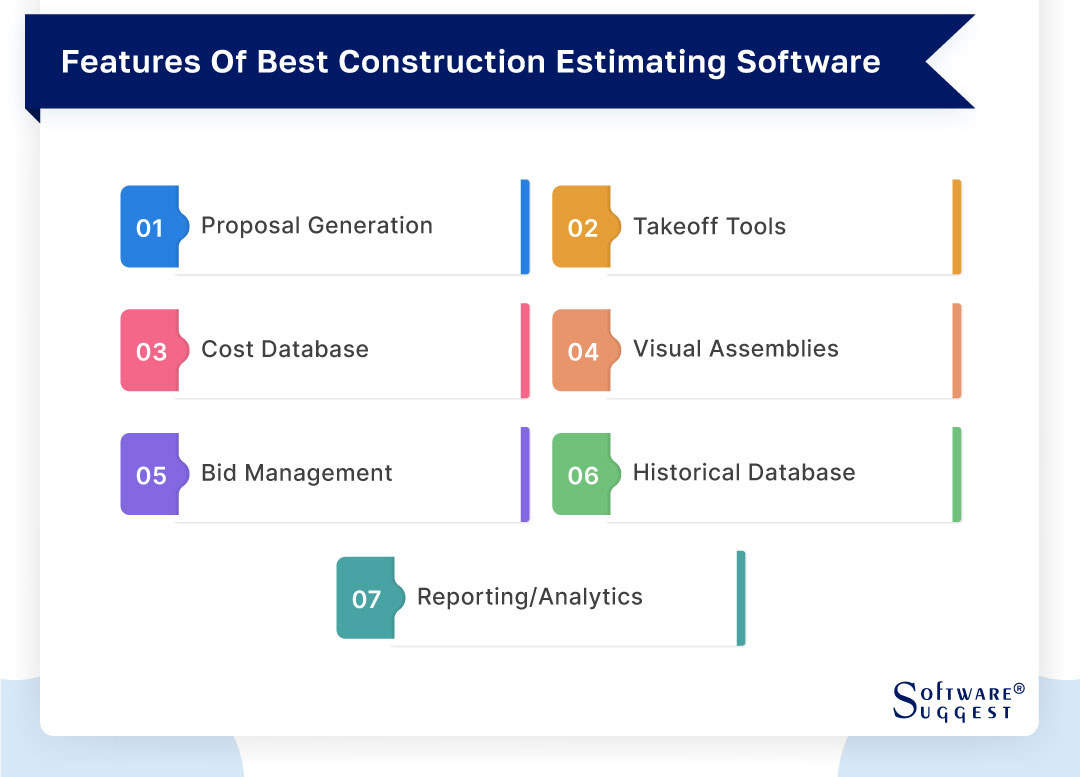
-
Proposal generation
Efficient proposal generation is a linchpin in the best estimating software. This feature accelerates the formulation of intricate and accurate construction estimates. Thus seamlessly integrating essential components like project specifications, exhaustive cost breakdowns, and pragmatic timelines. Beyond the evident time-saving advantages that streamline workflows, it serves as a transformative force in enhancing the professionalism infused in bids.
The software's adeptness in proposal generation is more than a time-saving mechanism. It becomes a catalyst for elevating bid professionalism, substantially amplifying the likelihood of project acquisition. In the fiercely competitive construction market, this proficiency becomes a strategic advantage.
-
Takeoff tools
In the world of top-tier civil estimating software, comprehensive takeoff tools are fundamental for precision in project estimation. These advanced tools empower users to intricately measure materials and labor needs. Thus utilizing project drawings or blueprints as reference points. The outcome is a meticulous analysis of project requirements. Hence substantially reducing the probability of errors in cost estimation.
The sophistication embedded in these takeoff tools is pivotal. Ultimately directly influencing the construction estimating software's capacity to furnish precise and dependable cost projections. Remember, it is a critical facet in the lifecycle of construction projects. This intricacy ensures that the construction project estimating software remains a trusted resource for accurate cost assessments. Finally, contributing to successful project planning and execution.
-
Cost database
Construction estimating software cost relies on its strength lies in its robust cost database. This feature houses a vast and regularly updated repository of construction costs, covering materials, labor, and equipment. The residential construction estimating software taps into this database to guarantee accurate estimates aligned with current market rates.
This reliability positions the software as a trustworthy tool for budgeting, forming the basis for meticulous financial planning in the construction industry. With a dependable cost database, the construction estimating software becomes an essential asset. Hence ensuring precision in cost assessments and facilitating strategic financial decisions throughout the construction project lifecycle.
-
Visual assemblies
The inclusion of visual assemblies in quoting software for builders injects a dynamic and intuitive dimension into project understanding. This feature allows users to craft visual representations of project components, fostering clearer communication within project teams.
Moreover, these visual representations enhance the transparency of estimates for clients and stakeholders. Thus offering an interactive and easily digestible portrayal of the overall project structure and associated costs. Visual assemblies contribute to a more collaborative and communicative approach to project estimation. Finally aligning diverse stakeholders on the project's visual and financial aspects.
-
Bid management
Bid management functionalities emerge as a crucial component, streamlining the intricate process of bidding for construction projects. Top construction estimating software equipped with robust bid management tools facilitates the creation, tracking, and overall management of bids. This ensures that every stage of the bidding process is organized, easily accessible, and efficiently executed.
Bid management capabilities contribute to a more systematic workflow. They enhance a contractor's ability to secure projects by facilitating the creation of competitive and well-organized bids. This becomes a decisive factor in the competitive construction landscape.
-
Historical database
The historical database feature within top estimating software serves as a valuable reservoir of past project data. It systematically stores and organizes crucial details from previous projects, encompassing costs, materials utilized, and project specifications. This historical repository becomes a reference point for construction professionals as it gives detailed cost estimates.
-
Reporting/analytics
Robust reporting and analytics tools emerge as indispensable elements in construction estimating software. Thus providing a comprehensive framework for monitoring and evaluating project success. The construction costing software's capacity for customizable reporting features offers real-time insights into project costs, profitability, and overall performance.
How to Choose the Right Estimating Software?
Construction industry experts must make a crucial choice when choosing estimating software. The construction sector is becoming more and more dependent on technology, therefore it's critical to choose software that meets your demands. Let's see how to choose.
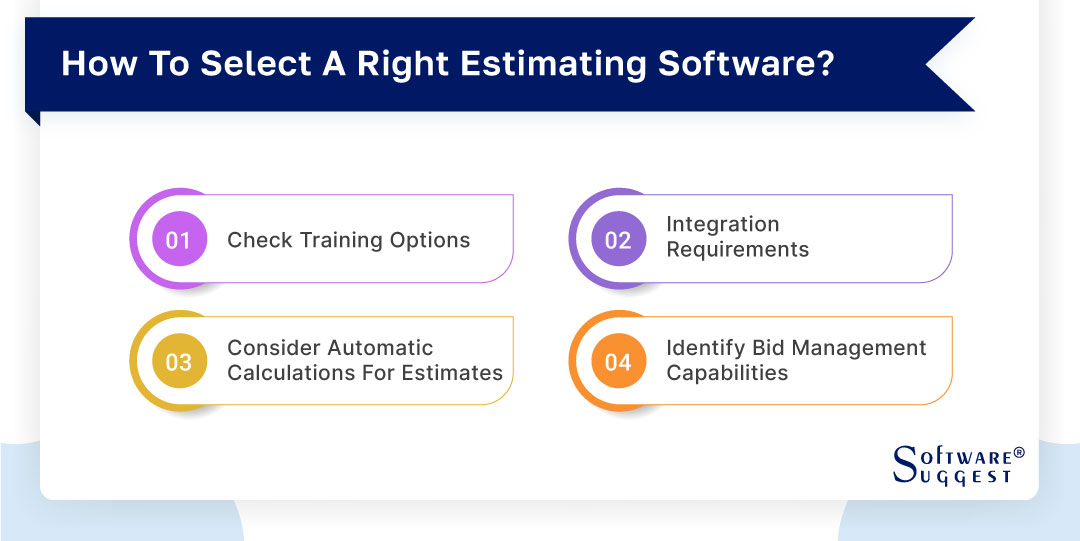
-
Check training options
Efficient utilization of estimating software hinges on the proficiency of your team. Before making a decision, assess the training options provided by the software vendor. Look for platforms that offer comprehensive training programs, including tutorials, webinars, and documentation. A user-friendly interface and intuitive features can also reduce the learning curve.
-
Integration requirements
Construction projects involve a multitude of tools and systems, from project management software to accounting platforms. Seamless integration between estimating software and other tools is crucial for estimating process and workflow efficiency. Evaluate if the software can seamlessly integrate with your existing systems and gauge its compatibility with them.
A cohesive ecosystem of integrated tools streamlines data flow, reduces manual data entry, and minimizes the risk of errors. It enhances collaboration across different facets of the construction process, from estimation to project management and accounting. Choose software that fosters a connected and interoperable environment. Consequently, you can be sure that information is shared across different parts of your building projects with ease.
-
Consider automatic calculations for estimates
The heart of estimating software lies in its ability to generate accurate and timely estimates. Manual calculations are not only time-consuming but also prone to errors. Look for software that offers automatic calculations for estimates based on industry standards and customizable formulas. Automation improves accuracy while also speeding up the estimating process.
Advanced algorithms have the ability to consider a broad spectrum of factors, encompassing labor and material costs as well as market fluctuations. This ensures that your estimates remain accurate and aligned with current market conditions. Additionally, leveraging these algorithms can save time and mitigate the likelihood of human errors.
-
Identify bid management capabilities
Effective bid management is a cornerstone of successful construction projects. Strong bid management features should be provided by the best estimating software. This contains functions including tracking, equipment expenses, analysis, and bid creation. Examine the construction costing software's capacity to manage all the complexities involved in the bidding process, from filing bids to managing documents.
What are the Challenges Faced in Construction Estimating Software?
Construction estimating software has revolutionized the way projects are planned and executed, but it is not without its challenges. In this section, we dive into key hurdles faced in construction estimating software.
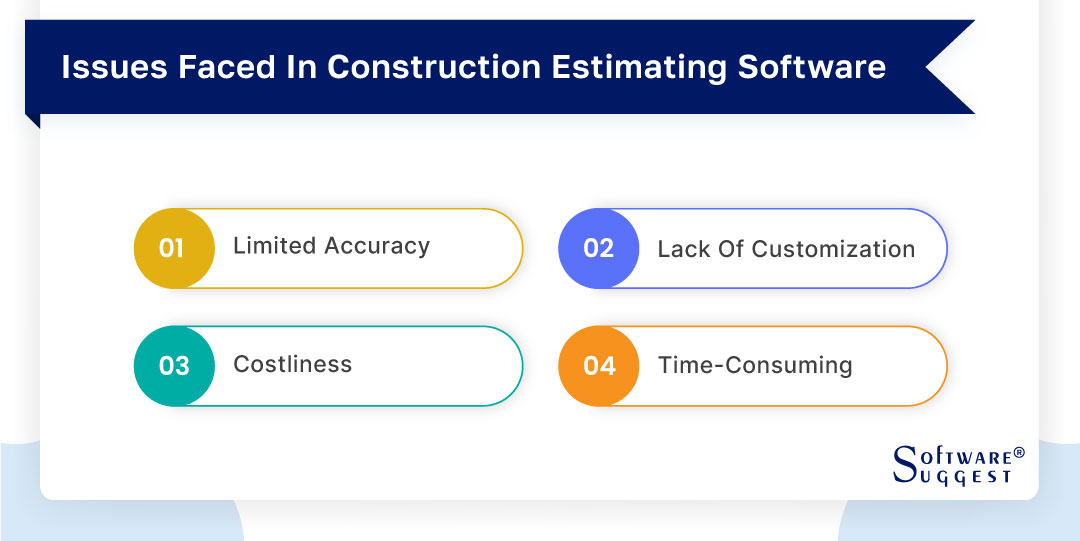
-
Limited accuracy
One of the fundamental challenges encountered in construction estimating software is the quest for absolute accuracy. While these tools boast advanced algorithms and databases, the complex nature of construction projects introduces variables that can be challenging to predict.
Construction projects are susceptible to unforeseen circumstances such as weather conditions, unforeseen site complexities, and variations in material costs. Estimating software may struggle to account for these nuances. Hence leading to discrepancies between projected costs and actual expenses. Achieving precision in estimates requires constant refinement and adaptation to the dynamic nature of construction environments.
-
Lack of customization
Large-scale commercial projects and modest residential developments are only two examples of the inherent diversity of construction projects. Estimating software frequently faces difficulties in trying to meet the particular needs of every project. Solutions that are designed to match all situations might not have the adaptability required to meet the unique requirements of various construction scenarios.
The absence of opportunities for customization may lead to general estimations that are out of step with the specifics of a certain project. Construction professionals often find themselves constrained by rigid software structures. Thus limiting their ability to tailor estimates to the specific variables of each undertaking. Overcoming this challenge necessitates the development and integration of more adaptable and customizable features within estimating software.
-
Costliness
While construction estimating software is a valuable asset, its costliness can pose a significant challenge for smaller businesses or independent contractors. Acquiring, implementing, and maintaining advanced estimating software involves a financial commitment in the construction industry. Integrating equipment costs further adds to the financial considerations. Thus emphasizing the need for a balanced evaluation of benefits versus budget constraints.
The initial investment, along with ongoing subscription fees and potential training costs, can strain the budgets of smaller enterprises. Balancing the benefits of enhanced project management and accuracy against the financial outlay becomes a crucial consideration. Also, striking the right balance between functionality and affordability is an ongoing challenge.
-
Time-consuming
Despite the automation capabilities of estimating software, the implementation process and the learning curve associated with these tools can be time-consuming. Construction professionals often face challenges in seamlessly integrating estimating software into their existing workflows.
Learning to navigate the construction estimating software, inputting project-specific data, and adapting to new features demand time and resources. In a field where time is frequently of the essence, the first stage of software implementation may cause more problems than it solves. Addressing this challenge involves optimizing user interfaces, providing comprehensive training resources, and minimizing disruptions.
Software and Services Related to Contractor Estimating Software
Contractor estimating software is a crucial tool in the construction industry, streamlining the estimation process. In this section, we delve into the essential software and services that complement contractor estimating software.
-
Construction project management software
Construction projects must be executed successfully, which requires effective project management. A thorough project oversight system is produced by combining contractor estimating software with construction project management software. Project managers can plan projects, assign resources, and monitor advancement. Also, they can work together with team members thanks to this program.
Integrating project management software with estimating tools ensures seamless coordination between the planning and execution phases. Thus enhancing overall project efficiency. The collaborative features of project management software facilitate real-time communication among project stakeholders. Hence ensuring everyone is on the same page regarding project timelines, milestones, and changes.
-
Bid management software
An essential component of the construction industry is bid management. By expediting the bidding process, specialized bid management software enhances contractor estimating software. This builder estimating software assists contractors in creating, organizing, and tracking bids. It centralizes bid-related information, making it easily accessible for team members involved in the bidding process.
Document management, bid tracking, and communication tools are common elements of bid management software. These functionalities enhance collaboration among team members during the bidding phase. Thus ensuring that all relevant information is readily available. Integrating bid management software enhances bid organization, increasing the chance of winning lucrative projects.
-
Construction accounting software
The financial aspect of construction projects is intricate, necessitating robust construction accounting software. With its features for budgeting, invoicing, tracking expenses, and financial reporting, this program is a great addition to contractor estimating tools. Integrating accounting software aligns estimated costs with actual project financials.
Construction accounting software helps contractors manage project budgets effectively, monitor cash flow, and generate accurate financial reports. This integration provides a holistic view of project finances. It includes from initial estimates to final costs, enabling contractors to make informed financial decisions. The synergy between estimating and accounting tools contributes to better financial control and transparency.
-
Prequalification software
Prequalification is a critical step in the construction project lifecycle, ensuring that contractors have the necessary qualifications and capabilities to undertake specific projects. Prequalification software complements contractor estimating software by streamlining the prequalification process. With the help of this program, contractors can record their credentials, licenses, and prior project experience.
It provides a centralized platform for managing prequalification documents, making it easier for contractors to submit their credentials to potential clients or project owners. Combining prequalification software with estimating tools streamlines the contractor's work. Thus making it easier to assess project feasibility and submit competitive bids.
Market Trends in Construction Estimating Software
The global construction estimating software market is poised for significant growth , with forecasts indicating a steady expansion from 2022 to 2030. Let's see what is coming up -
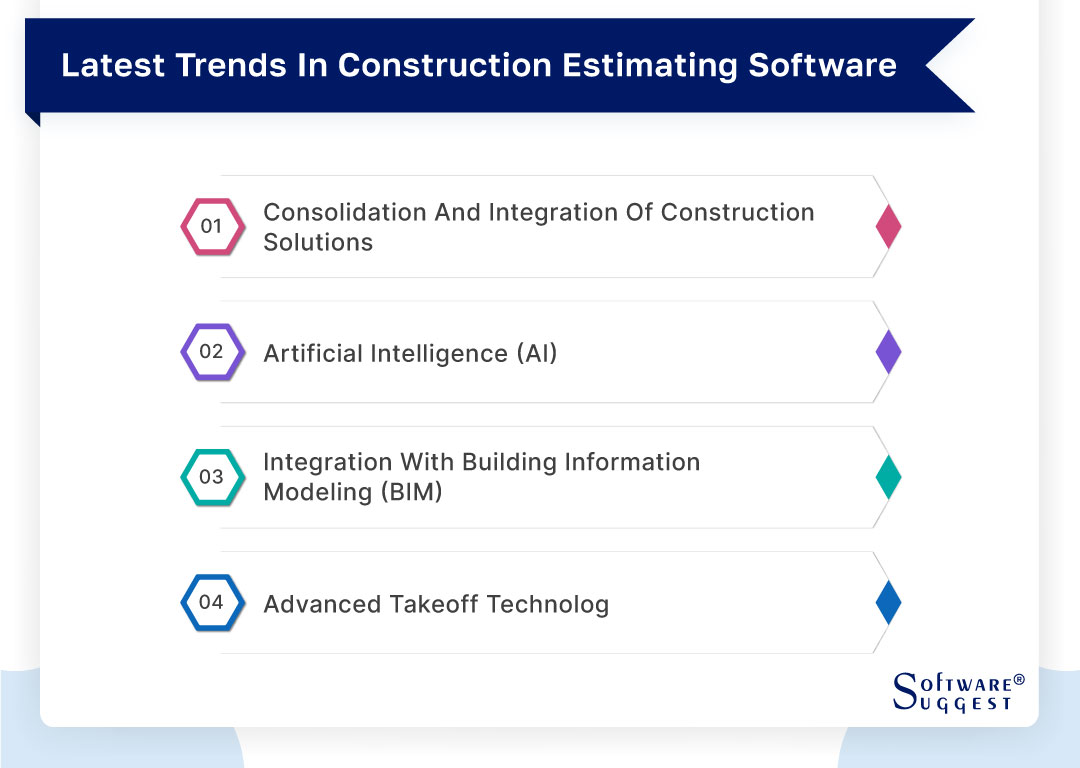
-
Consolidation and integration of construction solutions
Industry leaders are enhancing their market presence and revenue by collaborating with construction design firms. This strategic partnership aims to meet the increasing demand for innovative construction estimation software. Major players are actively expanding their service network and global footprint. Thus emphasizing the importance of a robust client network for sustained growth.
-
Artificial Intelligence (AI) in construction estimation software
Anticipated growth in the use of AI within construction estimation software is on the horizon. AI's implementation promises to automate routine tasks, enhance accuracy, and minimize errors in the estimation process. This technological advancement aligns with the industry's quest for efficiency and precision, offering a glimpse into the future of streamlined construction workflows.
-
Integration with building information modeling (BIM)
To elevate the accuracy of estimates, the integration of construction estimation software with BIM is gaining traction. This integration provides a more detailed and comprehensive project view, enabling precise estimations. Industry leaders recognize the value of incorporating BIM into their software solutions. Thus reflecting a commitment to leveraging advanced technologies for improved project outcomes.
-
Advanced takeoff technology
By revolutionizing the estimation process, advanced takeoff technology plays a pivotal role in enhancing speed and accuracy. By automating measurement and quantity calculations, this technology streamlines the estimation workflow. Its integration into construction estimation software reflects a commitment to leveraging cutting-edge tools for efficiency gains in the crucial phase of project planning and budgeting.
Conclusion
In conclusion, selecting the best construction estimating software is pivotal for streamlined project management and accurate cost projections. Each section in this guide offers unique features catering to diverse needs. Consider your project scope, team size, and specific requirements to make an informed choice.
Whether it's user-friendly interfaces or advanced analytics, the right software enhances efficiency, accuracy, and overall project success. Choose wisely for optimal construction estimating. Also, don't forget to read our guide for your next purchase.
FAQs
The cost of a construction estimating software plan ranges from $20 to $500+ per month. It fluctuates and is dependent upon variables like vendor pricing models, scalability, and features. It is wise to investigate several choices and select one that fits certain business requirements.
Yes, many contractor estimating software solutions come equipped with advanced takeoff tools, allowing for automated measurement and calculation of quantities. This feature enhances accuracy and efficiency in the estimation process.
Estimating software often includes robust document management features. This encompasses organizing and storing project-related documents, facilitating easy access and collaboration among project stakeholders.
Estimating the cost of construction involves considering various factors such as materials, labor, equipment, and project specifications. Construction estimating software streamlines this process by automating calculations and providing a comprehensive view of project costs.
By Countries







.png)













